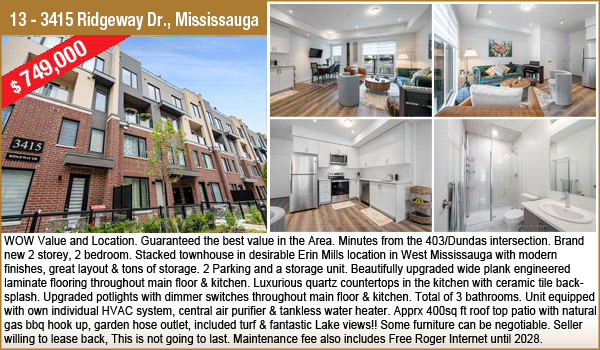It becomes necessary for every homeowner to have ‘umbrella’ insurance for those rainy-day, expensive emergencies
“If it’s not raining, why do I need an umbrella insurance policy?”
As a real estate lawyer, I have never actually been asked that question, but almost every time I suggest umbrella insurance to a client, they follow up by increasing their insurance coverage.
An umbrella policy is an insurance contract which provides additional liability coverage to underlying policies on a house, condominium, cottage, rental property, car, or boat.
Coverage under an umbrella policy kicks in when the other policies run out.
It provides an extra layer of protection against lawsuits resulting from damage to someone else’s property, or injuries due to an accident.
Typical residential policies carry liability protection of $1 or $2 million. I always recommend clients have at least $2 million in coverage. A separate umbrella policy can add an additional $2 or $3 million in liability protection for a relatively modest premium.
Let’s take a typical condominium on the 20th floor of a Toronto high-rise. A flood in that unit could result in water damage to units on every floor below. Liability protection of only $1 or $2 million might not be enough to reimburse all the damaged units.
The same applies to a fire in a condominium or single-family house which causes more than $2 million damage to neighbouring houses or units.
It’s also easy to imagine a car accident where personal injury damages could exceed $2 million,
And this is why I often recommend an umbrella policy to clients.
Based on my years of practicing real estate law, I also recommend clients carefully consider adding extra coverages to their home insurance policies, to protect against claims from:
Cyber and identity theft: Homeowners should consider protection against online security risks such as identity theft, ransomware and cyber extortion, as well as expenses to recover personal data from online fraud or data breaches.
Condominium improvements: Typical condominium insurance only covers the base unit without cabinets, fixtures and flooring. I recommend insurance protection for what insurers call ‘betterments.’
Water damage: Standard policies often exclude coverage for some types of water damage such as flooding through basement windows or walls.
Special limits: Coverage caps often apply to items such as jewelry, coin collections, designer handbags, fine art, bicycles and boats. These must be insured by a rider attached to the policy.
Claim forgiveness: Some policies offer forgiveness from premium increases after a covered loss. It’s worth considering.
Rental income: Additional coverage must be purchased to cover lost rental income from an investment property.
As well, insured homeowners should always discuss with their broker issues like:
• Do I need extra coverage if I am running a business from home?
• What insurance do I need for renovations?
• Is there coverage if the property is vacant, the use has changed, or is being used for short- or long-term rentals?
Homeowners can often save money by bundling house or condo policies with their auto insurance. Monitored fire and burglar alarms may qualify the owner for reduced premiums.
Water leak alarms, sump pumps and backwater valves can detect leaks in houses early and can qualify the insured owner for premium discounts.
And finally, for homes, it is essential to have coverage for full replacement value. Without this, an insurer may only pay part of the cost of an insured claim.
This article was first reported by The Star













